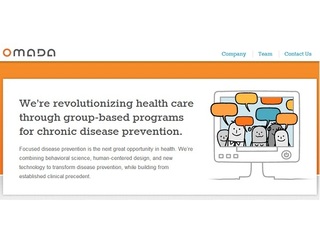Nao Medical adopts AI medical coding software XpertDox
Nearly $265B in claims are denied every year because of the way they're coded
Read more...
For the first time in history, chronic disease now kills more people worldwide than infectious disease. In other words, where people were once worried about cholera and tuberculosis, they now have heart disease and diabetes to fear.
Digital therapeutics company Omada Health is coming up with telehealth solutions to lifestyle-based chronic conditions, starting with its flagship program “Prevent,” for treatment of pre-diabetes. The company, which raised a $4.7 million Series A round last year, announced Wednesday that it has raised $23 million in a Series B round led by Andreessen Horowitz, with participation from Kaiser Permanente Ventures and existing investors including U.S. Venture Partners and The Vertical Group. The Rock Health graduate has raised $28.5 million altogether.
A shocking 43% of all U.S. adults are either diabetic or prediabetic. That’s insane. To make matters worse, the majority of people who are prediabetic don’t even know it, since it tends to come part-and-parcel with being overweight or obese—and wouldn’t you know it, more than one-third of U.S. adults are obese.
Omada’s “Prevent” program is modeled around the National Institutes of Health study called the Diabetes Prevention Program and is designed to help participants modify their behavior and reduce their risk of Type 2 diabetes. Users are paired up with a health coach who guides them through different lifestyle changes. They also get weekly activities on nutrition and exercise that they can complete from a mobile device. Additionally, Omada mails participants a wireless scale that automatically tracks their weight online, along with a pedometer and other nifty gifties.
The healthcare costs of diabetes and prediabetes in the U.S. are expected to tip the scales at $500 million by 2020. Individual diabetics incur average annual costs of $13,700.
The program gets results: on average, participants lose 6% of their body weight in 16 weeks. The company won’t say how many people have used Prevent to date, but it does say that it has ten enterprise customers using Prevent for their employees.
“Omada’s mission is to inspire people to alter the habits that place them at risk for serious but preventable conditions,” said CEO Sean Duffy, in a statement. “This vote of confidence from Andreessen Horowitz, combined with the work we’re already doing for major organizations like Blue Cross Blue Shield Louisiana and Stanford Hospital, reinforces our belief that consumers are ready for health programs that are rooted in science and tangible outcomes, yet are designed and delivered digitally as natural extensions of how we live today.”
The company has said that it is planning an expansion that would include prevention programs for other types of chronic conditions, but hasn’t said which. It has said, however, that it will likely have one or two new programs in-market in 2015.
Omada plans to use the new capital to expand its sales and marketing teams, hire additional team members in design and development, and build new products. The company expects to double its headcount to 60 people by the end of the year.
Nearly $265B in claims are denied every year because of the way they're coded
Read more...Most expect to see revenue rise, while also embracing technologies like generative AI
Read more...The market size for 2023 was $10.31 billion
Read more...
